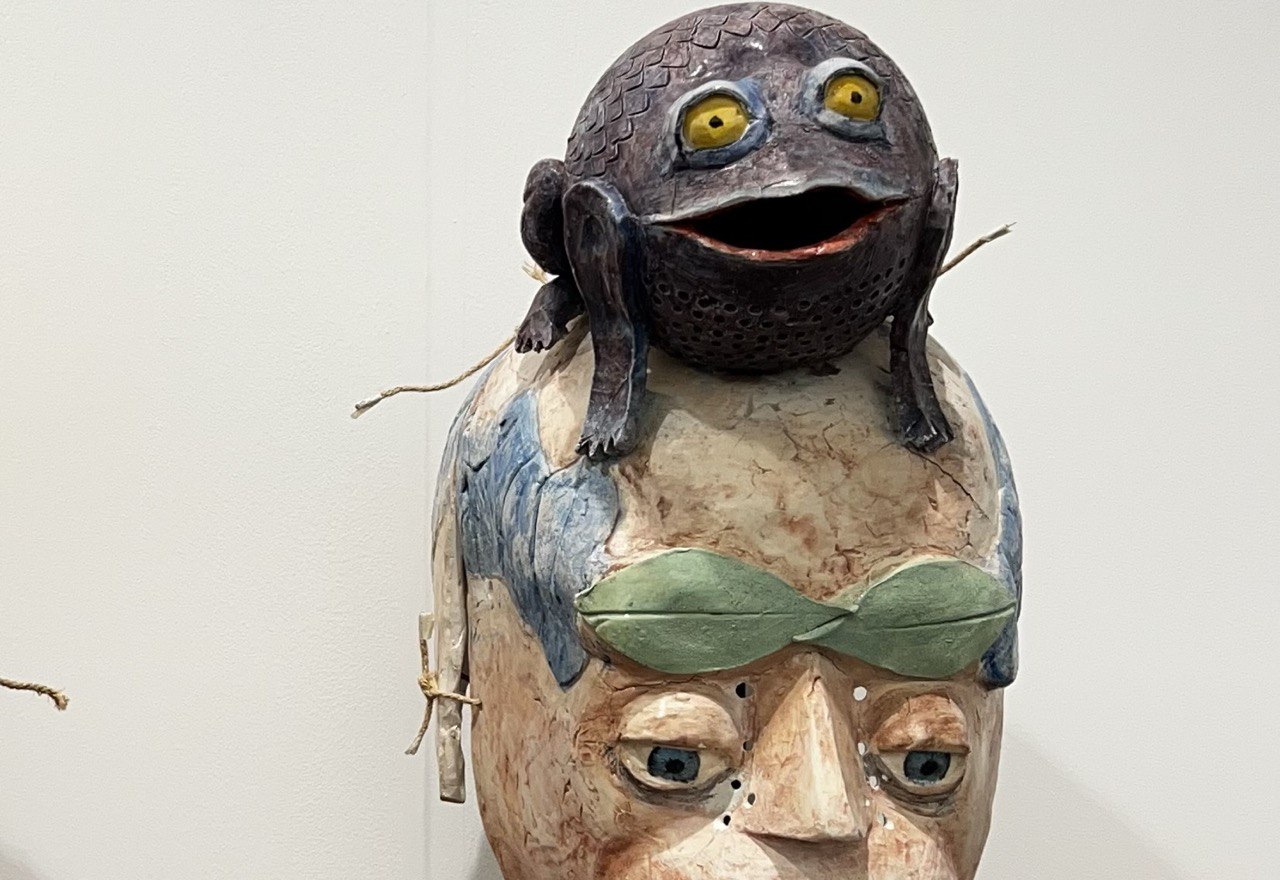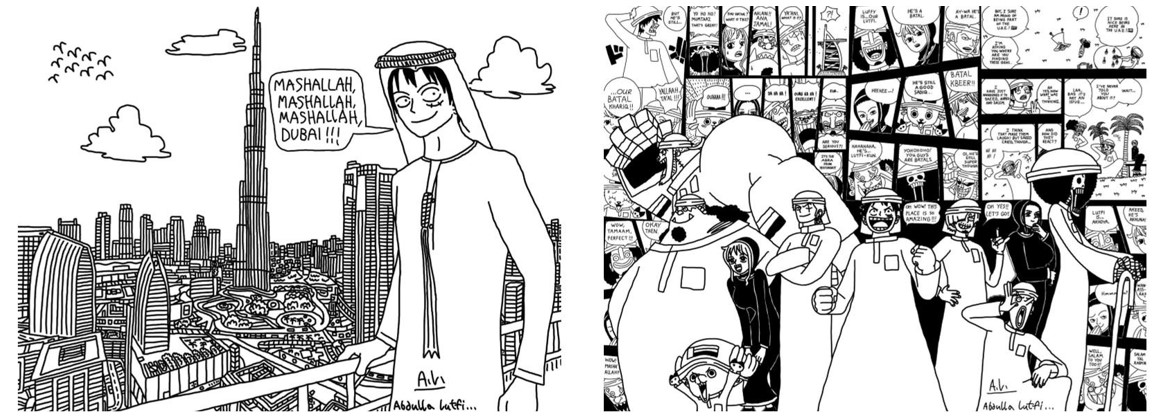Zarqa Al Yamama is the first Grand Opera to feature international and local artists performing a libretto exclusively in Arabic, written by the award-winning Saudi poet Saleh Zamanan and adapted into an original musical score by Australian composer Lee Bradshaw, under the creative direction of Ivan Vukcevic.
The titular role of Zarqa was performed by world-acclaimed mezzo-soprano Dame Sarah Connolly, alongside a principal cast of leading international artists including Amelia Wawrzon, Serena Farnocchia, Paride Cataldo, Aleksandar Stefanoski and George von Bergen. Of the nine main roles, three were performed by Saudi-born singers, including tenor Khayran Al Zahrani, and sopranos Sawsan Albahiti and Reemaz Oqbi.
Led by conductor Pablo González, the opera was performed by the Dresdner Sinfoniker featuring vocal accompaniments by the Czech Philharmonic Choir Brno. The transformative staging and special effects were devised by internationally renowned stage director Daniele Finzi Pasca.
With its innovative fusion of Arabian and Western influences, Zarqa Al Yamama introduces a groundbreaking entry to the opera canon, enriching global cultural repertoire with its unique resonance and depth.
Through this production, Saudi Arabia enhances the contribution of the performing arts to its cultural landscape and promotes Saudi culture on the global stage. Zarqa Al Yamama also gives audiences a rare chance to experience a historic first for the worldwide art form.

Underneath the Arabian sky, in Riyadh’s embrace, I witnessed a spectacle that left me in a daze: Zarqa Al Yamama, the first Arabic Opera’s debut—a mesmerizing journey, both ancient and new.
From the grandeur of the stage to the orchestra’s tune, every detail was meticulously crafted like a precious gem hewn, lights dancing, scenography like a painting come to life—a sensory feast that banished all strife.
World-renowned singers graced the stage with their art, their voices weaving tales that touched every heart, each movement, each note, a symphony of emotion, a celebration of culture, a poetic devotion.
The Ministry of Culture of Saudi Arabia’s creation: a beacon of light in the Gulf’s cultural transformation, opening doors to new horizons, infinite possibilities, a revolution in the making, a cultural renaissance, truly.
In this moment, I felt the power of art to unite, to transcend borders, to bring hearts to light, Zarqa Al Yamama, is an opera like no other—a magnificent ode to culture, a divine wonder.
Forever etched in my memory, this night of pure bliss, a testament to the magic of art, a moment I’ll dearly miss, grateful to have witnessed history in the making, Zarqa Al Yamama, a treasure worth taking.
by: Marco Fraschetti

This production will allow contemporary audiences to experience one of ancient Arabia’s most enduring stories like never before. Passed down from one generation to the next since the pre-Islamic era, the tale of Zarqa Al Yamama has continued to resonate with the modern age, evolving across multiple geographies. One of the world’s great literary works, the tale centers on Zarqa, a woman hailing from the Geddes tribe, residing in the famous Al Yamama region of the Arabian Peninsula during the pre-Islamic era. Renowned for her acute perception, Zarqa held a revered place among her people and was admired for her exceptional wisdom, strength, eloquence, and keen insight.
The story sheds a fascinating light on the period, especially on the esteemed roles women played in ancient Arab society, including merchants, poets, and influential advisors. Together, wielding considerable influence in shaping the course of events, leaving an indelible mark on the world around them.


Zarqa Al Yamama Key people:
Overseeing the project is Sultan Al-Bazie, CEO of the Theater and Performing Arts Commission, whose diverse expertise has been instrumental in advancing theater arts and the rich landscape of Saudi culture. The original text of the piece was penned by the esteemed Saudi poet and theater critic, Saleh Zamanan. The original musical score is crafted by the internationally renowned composer, Lee Bradshaw.
World-acclaimed mezzo soprano Dame Sarah Connolly leads the principle vocal cast in the title role of Zarqa Al Yamama. Of the nine main roles, three will be performed by prominent Saudi Arabian singers, including tenor Khayran Al Zahrani, with sopranos Sawsan Albahiti and Reemaz Oqbi as bridesmaids. They will share the stage with internationally renowned artists, including bass Clive Bayley, soprano Amelia Wawrzon, soprano Serena Farnocchia, tenor Paride Cataldo and baritone George von Bergen. The opera is performed by the award-winning Dresdner Sinfoniker, featuring vocal accompaniments by the Czech Philharmonic Choir.
The orchestra also includes Saudi musicians, adding a distinct musical dialect to the score. Costume designer Giovanna Buzzi ensured the costumes reflected both the pageantry of the grand opera and the visual aesthetics of pre-Islamic Arabia. Meanwhile, mesmerizing staging and special effects, devised by stage director Daniele Finzi Pasca showcase the power of intercultural exchange to transport audiences to the enchanting world of ancient Arabia .
The history of Zarqa Al Yamama:
A Legend Woven in Sand Woven into the very fabric of Arabian lore, Zarqa Al Yamama stands as a testament to exceptional sight and wisdom. Her name echoes in ancient proverbs, a byword for piercing vision and sound judgment: “Sharper than Zarqa”, they whispered, and “Wis er than Zarqa”. Even the verses of renowned poets like Al Nabigha, Al Mutanabbi, and Abu Nuwas shimmered with her legend. Though the sands of time have obscured some details, Arab heritage texts paint a vivid portrait of Zarqa Al Yamama’s world. Accounts vary on her name and lineage, but many, like Al Hamawi in his Mu’jam Al Buldan, agree that her name and lineage were indeed “Al Yamama”, and that the verdant heart of the Arabian Peninsula, the region of “Jaw,” bore her name.
Al Mas’udi, a chronicler of renown, described Jaw as a land of unparalleled bounty, its embrace adorned with vibrant trees, vineyards heavy with fruit, and gardens that whispered secrets in the desert breeze. Grand palaces, like sentinels, watched over bustling villages and cities, including “Manfuha”, the birthplace of Al A’sha, the weaver of words in the Hanging Poems.
Yet, amidst this tapestry of life, tragedy unfolded. Arab heritage texts converge on the essence of this tale a poignant narrative of the demise of two ancient tribes, the Tassam and the Jadis.
Zarqa Al Yamama belonged to the Jadis, who bore the brunt of the tyranny of Amliq, a king of the Tassam who ruled Jaw with an iron fist. His cruelty knew no bounds, and the Jadis people suffered under his yoke. But the Jadis were a people of cunning. They devised a plan, swift and decisive, and vanquished Amliq and his tribe, leaving only one survivor to flee south and seek vengeance from Tubba, the mighty king of the Himyarites. Driven by a thirst for retribution, Tubba sent an army that swept through Jadis’ lands, leaving behind only the echo of a once-proud people.
Throughout this tumultuous saga, Zarqa Al Yamama served as both a witness and a seer. She warned her tribe of the approaching army, her vision piercing the veil of distance.
“Trees! I see trees marching towards us!” she cried. The Jadis derided her frantically. “Trees! Trees walking?” they scoffed. Yet, Zarqa was right. The approaching army, cloaked by the foliage they carried, advanced unseen until it was too late. The Jadis, blinded by disbelief, met their fate. Their demise echoed through the ages, their names inscribed alongside Ad and Thamud, the lost tribes of the desert.
The exact era of Zarqa Al Yamama remains shrouded in mystery. Estimates suggest the Himyarite raid occurred sometime after 140 CE.
This aligns with the writings of geographer Claudius Ptolemy, who may have referenced the Jadis tribe as “Jodisitae” or “Joiisitae” around 125 CE. Alternatively, archaeologist Abdulrahman Al Ansari suggests a possible link to the Dadan kingdom, placing the Jadis and Tassam between the 6th and 5th centuries BCE.

Zarqa Al Yamama
King Fahad Cultural Center – Riyadh – KSA
April 25 – May 4, 2024





